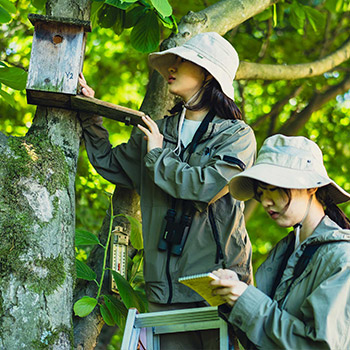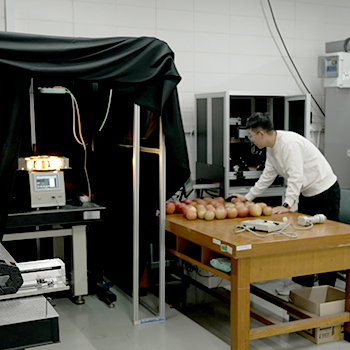Department of Agriculture, Forestry and Bioresources
☎ +82-2-880-4903
200-1008A
As sovereignty and rights of the industrial utilization of bioresources are reinforced from the Nagoya Protocol going into effect, the discovery of agriculture and forest bioresources, creative convergent research, and human resource development for bio-industriy are strongly required. The Department of Agriculture, Forestry and Bioresources is a graduate school department newly organized in 2020, uniting five majors: Crop Science and Biotechnology, Horticultural Science and Biotechnology, Forest Environmental Science, Environmental Materials Science, and Biomaterials Science. The Department aims to discover agricultural and forest bioresources and carry out creative convergent research and human resource development, to deal with radical changes in the agricultural environment according to the Fourth Industrial Revolution.
The Department will lead world-class development of human resources and convergent research by educational innovation, research innovation and globalization, based on academic achievements of five majors.
For innovative human resource development in the 21st century, the Department promotes interdisciplinary education among majors, establishment of new curriculums for convergent research, expansion of education through team-teaching, management of user-oriented curriculums focusing on problem-solving, and construction of an academic infrastructure with participatory curriculums.
The Department will reinforce the conservation of agricultural bioresources, competitiveness in the seed industry, genomics research, development of IT-based cultivation technologies, construction of smart farm systems, formation of sustainable eco-friendly bioresources ecosystem, development of cutting-edge biomaterials, and research on high value-added environmental materials.
Through the innovation of education, research and globalization, the Department will transcend boundaries between majors, and foster creative scholars leading convergent researches. Graduates will be pioneers of the 21st century industrial society in Universities, enterprises, research insititutes, etc. as leaders of agriculture and forest bioresources fields, and play important roles in the creation of high value-added bio-industries in the future.
The Department will lead world-class development of human resources and convergent research by educational innovation, research innovation and globalization, based on academic achievements of five majors.
For innovative human resource development in the 21st century, the Department promotes interdisciplinary education among majors, establishment of new curriculums for convergent research, expansion of education through team-teaching, management of user-oriented curriculums focusing on problem-solving, and construction of an academic infrastructure with participatory curriculums.
The Department will reinforce the conservation of agricultural bioresources, competitiveness in the seed industry, genomics research, development of IT-based cultivation technologies, construction of smart farm systems, formation of sustainable eco-friendly bioresources ecosystem, development of cutting-edge biomaterials, and research on high value-added environmental materials.
Through the innovation of education, research and globalization, the Department will transcend boundaries between majors, and foster creative scholars leading convergent researches. Graduates will be pioneers of the 21st century industrial society in Universities, enterprises, research insititutes, etc. as leaders of agriculture and forest bioresources fields, and play important roles in the creation of high value-added bio-industries in the future.

Programs
Program in Forest Environmental Science
☎ +82-2-880-4777
+82-2-873-3560
200-7208
Forest environmental science deals with forest-related environments which support the world's most important resources. Forests clean the air, prevent erosion, moderate the availability and quality of water, and provide renewable raw materials for energy, shelter, and paper products.
Forests are habitats for endangered plant species and wildlife. They are important for recreation activities, such as hiking, hunting, and bird and wildlife viewing. At regional and global levels, forests may be significant factors in the climate.
Forest environmental science involves managing forest ecosystems within increasingly complex social environments. A challenging and demanding profession, forestry applies forest ecosystem sciences, management sciences, and communication skills to the conservation and management of forest resources to meet society's ever increasing need for commodities, services, and a healthy environment.
- International Exchange :
Our international short exchange programs collaborate with Hokkaido University in Japan and Bogor Agriculture University in Indonesia in order to improve students’ understanding of the northern hardwood forest and tropical rain forest. During our summer field practice in the University Forest at Mt. Jirisan and Mt. Baegunsan in Jeollanam-do, some of the Japanese students participate in our program and have chance to learn about our forest ecosystem. Since 1999, students who have participated in this exchange program can study at Hokkaido University or Obihiro University of Japan for two semesters. In addition, students can travel with professors to China, Japan, the Philippines, Nepal, Mongolia, Finland, and Russia as researchers or assistants, to experience the ecosystem ranging from tropical to temperate to boreal.
- Career Opportunities :
Career opportunities in research, management, teaching, or consulting are available with private corporations, environmental organizations, universities, environmental consultants, and governmental agencies. Our students may also find employment with public land management agencies, private organizations, the forest products industry, consulting firms, and trade associations.
Forests are habitats for endangered plant species and wildlife. They are important for recreation activities, such as hiking, hunting, and bird and wildlife viewing. At regional and global levels, forests may be significant factors in the climate.
Forest environmental science involves managing forest ecosystems within increasingly complex social environments. A challenging and demanding profession, forestry applies forest ecosystem sciences, management sciences, and communication skills to the conservation and management of forest resources to meet society's ever increasing need for commodities, services, and a healthy environment.
- International Exchange :
Our international short exchange programs collaborate with Hokkaido University in Japan and Bogor Agriculture University in Indonesia in order to improve students’ understanding of the northern hardwood forest and tropical rain forest. During our summer field practice in the University Forest at Mt. Jirisan and Mt. Baegunsan in Jeollanam-do, some of the Japanese students participate in our program and have chance to learn about our forest ecosystem. Since 1999, students who have participated in this exchange program can study at Hokkaido University or Obihiro University of Japan for two semesters. In addition, students can travel with professors to China, Japan, the Philippines, Nepal, Mongolia, Finland, and Russia as researchers or assistants, to experience the ecosystem ranging from tropical to temperate to boreal.
- Career Opportunities :
Career opportunities in research, management, teaching, or consulting are available with private corporations, environmental organizations, universities, environmental consultants, and governmental agencies. Our students may also find employment with public land management agencies, private organizations, the forest products industry, consulting firms, and trade associations.

Faculty
| Name | Major | TEL | |
|---|---|---|---|
| Professor Park Il-Kwon |
Forest Protection | +82-2-880-4751 | parkik1@snu.ac.kr |
| Professor Park Pil Sun |
Forest Ecology and Forest Soil Science | +82-2-880-4771 | pspark@snu.ac.kr |
| Professor Im, Sangjun |
Forest Engineering, Forest Hydrology, Watershed Management, Ecological Engineering | +82-2-880-4759 | junie@snu.ac.kr |
| Professor Kang Kyu Suk |
Forest Genetics and Breeding | +82-2-880-4753 | kangks84@snu.ac.kr |
| Professor Kim Hyun Seok |
Tree Physiology | +82-2-880-4752 | cameroncrazies@snu.ac.kr |
| Associate Professor LEE, YOHAN |
Forest Policy and Economics | +82-2-880-4754 | johnlee@snu.ac.kr |
| Associate Professor Choi, Chang-Yong |
Wildlife Ecology and Management | +82-2-880-4757 | sub95@snu.ac.kr |
| Associate Professor Choe, Hyeyeong |
Landscape Management and Geoinformatics | +82-2-880-4756 | hy.choe@snu.ac.kr |
| Assistant Professor Han, Hee |
Forest Management | +82-2-880-4755 | hee.han@snu.ac.kr |











